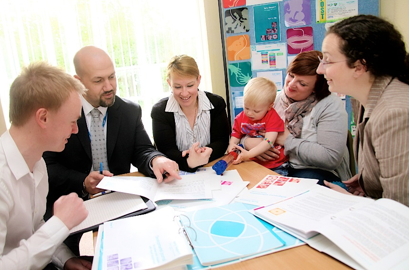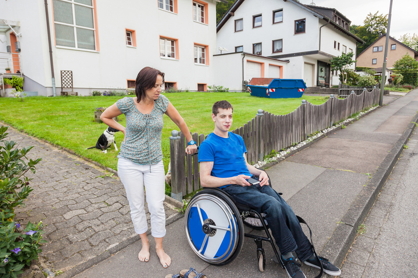An Introduction to Using Early Support Materials in Context course



This session focuses on key working being implemented in practice as well as how Early Support materials can be used and adapted by families and professionals.
Learning objectives
By the end of this session you will be able to:
- Explain the ethos of key working and how this can be implemented in practice
- Explain how Early Support (ES) materials can be adapted to address the needs of individual children and families
- Describe how developmental journals could be introduced and used by families and professionals
The previous session introduced you to the Early Developmental Support (EDS) principles and how the Early Support (ES) resources and way of working can help to put these into practice.
Session 2 will build on this, and show how the EDS principles and ES resources can be used in practice to provide joined-up services for children and young people. There will be a particular focus on using the ES resources within a key working approach.
Before commencing this session you should complete the following HCP session:
- Supporting Children's and Young People's Development (402-0076)
Silvana Mengoni is a research psychologist focusing on developmental psychology, special educational needs and disabilities and healthcare research. She is currently a Senior Research Fellow at the University of Hertfordshire working on a range of projects such as robot-mediated interventions for children with autism, feeding issues in Down syndrome, mental health interventions for adolescents, sustaining community living for adults with learning disabilities and epilepsy management for adults with learning disabilities.
Working with John Oates at the Open University, Silvana produced three Early Support Developmental Journals for children and young people with special educational needs and disabilities, conducted an evaluation of key working and produced national guidance on ‘Developing Key Working’ for the Council of Disabled Children (CDC).
Her PhD at the University of York focused on the development of reading and language skills in children with Down syndrome, and Silvana has continued her involvement in this area. She also has expertise regarding reading and language development in typically developing children and children with a range of different developmental disorders.

- End of Life Care | Specialist care | Tracheostomy ...
- Posted By eIntegrity Healthcare e-Learning
- Posted Date: 2025-01-10
- Location:Online
- This session covers basic knowledge required to keep patients safe if they have a tracheostomy and laryngectomy, including:<br><br>• Humidification<br>• Stoma care<br>• Securing the tube<br>• Maintenance: suction, inner tubes and c
- End of Life Care | Specialist care | Palliative ca...
- Posted By eIntegrity Healthcare e-Learning
- Posted Date: 2025-01-10
- Location:Online
- This session will discuss the features of some of the more common neuromuscular disorders, the physical and psychological issues which present with such disorders and the current practice for symptom control in palliative care.
- End of Life Care | Specialist care | Non-invasive ...
- Posted By eIntegrity Healthcare e-Learning
- Posted Date: 2025-01-10
- Location:Online
- Non-invasive ventilation (NIV) is an intervention which can improve both quality of life and survival for patients with motor neurone disease (MND). This session outlines the evidence base and practicalities of this important treatment option for patients
- End of Life Care | Specialist care | Intrathecal d...
- Posted By eIntegrity Healthcare e-Learning
- Posted Date: 2025-01-10
- Location:Online
- This session provides an overview of intrathecal drug delivery (ITDD) for the management of cancer pain. It aims to enhance the understanding of which patients may benefit from this approach and the principles which govern the safe use of ITDD systems. It
- End of Life Care | Specialist care | I'm not lovea...
- Posted By eIntegrity Healthcare e-Learning
- Posted Date: 2025-01-10
- Location:Online
- This session explores the concerns patients and their partners may have about intimacy and sex when approaching the end of life. It examines the challenges this raises for professionals and how most effectively to approach the topic. This session was revi








